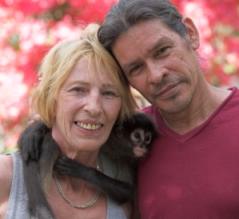 We never imagined that we would wind up running a sanctuary for spider monkeys when we first arrived here in paradise. We just wanted to find a little place on the beach to have a quiet and well-deserved retirement. Soon after arriving in 1999 we were approached by a local woman at a restaurant in a tourist area
trying to sell a baby spider monkey as a pet. The monkey was
obviously injured, malnourished and in need of medical care. We
insisted that she let us take him to a veterinarian and in the
examination we learned that he was on the verge of death. Severely
dehydrated, malnourished, ravaged by parasites, infection and abuse. We were advised
that he could not survive. Even if he did somehow recover after extensive treatments he would have nowhere to go and would die if released back into the wild. There was no facility in the area
that would provide him with the daily care that he would need for the rest of his life. A victim of the illegal pet trade, robbed of his family and childhood in the jungle and unable to survive alone. We asked the vet to fight for his life, deciding to worry later about where he would go if he managed to survive. Miraculously, he did survive! After concluding that there really was nowhere else he could go we began the arduous process of obtaining the necessary licenses from Mexico to legally care for him for life. That first monkey
was our Chaac and he remains here today, leader of the colony.
We never imagined that we would wind up running a sanctuary for spider monkeys when we first arrived here in paradise. We just wanted to find a little place on the beach to have a quiet and well-deserved retirement. Soon after arriving in 1999 we were approached by a local woman at a restaurant in a tourist area
trying to sell a baby spider monkey as a pet. The monkey was
obviously injured, malnourished and in need of medical care. We
insisted that she let us take him to a veterinarian and in the
examination we learned that he was on the verge of death. Severely
dehydrated, malnourished, ravaged by parasites, infection and abuse. We were advised
that he could not survive. Even if he did somehow recover after extensive treatments he would have nowhere to go and would die if released back into the wild. There was no facility in the area
that would provide him with the daily care that he would need for the rest of his life. A victim of the illegal pet trade, robbed of his family and childhood in the jungle and unable to survive alone. We asked the vet to fight for his life, deciding to worry later about where he would go if he managed to survive. Miraculously, he did survive! After concluding that there really was nowhere else he could go we began the arduous process of obtaining the necessary licenses from Mexico to legally care for him for life. That first monkey
was our Chaac and he remains here today, leader of the colony.
From that point on we began finding out that Chaac was not a unique case. There are hundreds, perhaps thousands, just like him in the region - orphaned, in need of medical care and at the mercy of a pet trader. After being purchased they are often left tied to a tree by a rope or locked in a dark cage in a city apartment. The would-be illegal pet owners who buy them discover they do not make good pets. Cute as they are, they become withdrawn, difficult and sometimes aggressive, physically and emotionally ill when they are forced to live in a human habitat. So the new owner soon abandons them and they are left helpless, never having learned how to survive in the wild. Word soon began to spread that we had a sanctuary for orphaned spider monkeys and wildlife agencies, veterinarians, tour guides, private citizens and more began asking if we could take in additional monkeys they knew of that were in similar situations. We currently provide a safe and happy home to 86 such spider monkeys. We strive to do much more than just allow them to survive. We spend our days doing everything we can to ensure that they enjoy the best quality of life possible here in their native jungle.
The rest as they say is history. Our original dream of a quiet retirement on the beach seems like a distant memory now, as we have devoted our full time and resources to the care of these angels of the jungle that nobody else was willing or able to provide.
Since 2002 The Jungle Place has been recognized by the Secretaría de Medio Ambiente y Recursos Naturales (SEMARNAT) as a Unidad de Manejo para la Conservación de la Vida Silvestre (UMA) with registry SEMARNAT/CITES/UMA-IN-0008-03/QROO which means that we operate in accordance with a management plan approved by the Mexican federal wildlife authorities and within which the status of the habitat and the rescued animals is permanently monitored. Desde el año 2002 estamos reconocidos por la Secretaría de Medio Ambiente y Recursos Naturales (SEMARNAT) como “Kuki Kaax” Unidad de Manejo para la Conservación de la Vida Silvestre (UMA) con registro SEMARNAT/CITES/UMA-IN-0008-03/QROO lo que significa que operamos de conformidad con un plan de manejo aprobado por las autoridades mexicanas y dentro del cual se da seguimiento permanente al estado del hábitat y de los ejemplares rescatados.
